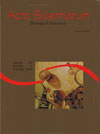<b>Biologia floral e polinização de pimenta malagueta (<em>Capsicum frutescens</em> L., Solanaceae): um estudo de caso</b> - DOI: 10.4025/actascibiolsci.v29i4.877
Resumo
A antese, a deiscência das anteras, a receptividade do estigma, o padrão de crescimento do tubo polínico e o percentual de vingamento dos frutos de Capsicum frutescens L. (Solanaceae) foram estudados em São Miguel do Anta, Minas Gerais, sudeste brasileiro. As flores de C. frutescens são perfeitas, protogínicas e recebem a visita de várias espécies de abelhas, principalmente da abelha melífera Apis mellifera L., que coleta pólen e néctar. Foram comparados tratamentos de polinização por abelhas, polinização cruzada manual, polinização aberta, polinização aberta emasculada e autopolinização espontânea. O padrão de crescimento dos tubos polínicos mostrou-se semelhante em todos os tratamentos. Os tubos atingiram o ovário cerca de 24 horas após a polinização. Apesar de C. frutescens ser considerada autógama, essa cultura beneficia-se da polinização realizada por A. mellifera, produzindo significativamente maior quantidade de frutos, quando comparada com a autopolinização espontânea.Downloads
DECLARAÇÃO DE ORIGINALIDADE E DIREITOS AUTORAIS
Declaro que o presente artigo é original, não tendo sido submetido à publicação em qualquer outro periódico nacional ou internacional, quer seja em parte ou em sua totalidade.
Os direitos autorais pertencem exclusivamente aos autores. Os direitos de licenciamento utilizados pelo periódico é a licença Creative Commons Attribution 4.0 (CC BY 4.0): são permitidos o compartilhamento (cópia e distribuição do material em qualqer meio ou formato) e adaptação (remix, transformação e criação de material a partir do conteúdo assim licenciado para quaisquer fins, inclusive comerciais.
Recomenda-se a leitura desse link para maiores informações sobre o tema: fornecimento de créditos e referências de forma correta, entre outros detalhes cruciais para uso adequado do material licenciado.













1.png)




3.png)













